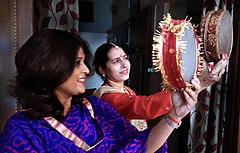
Back كارفا شوت Arabic কৰৱা চৌথ Assamese करवा चौथ AWA Карва-чаутх Bashkir करवा चौथ Bihari করবা চৌথ Bengali/Bangla کەروا چاوتە CKB Karva Chauth French करवा चौथ Hindi ಕರ್ವಾ ಚೌತ್ Kannada
| Karva Chauth | |
|---|---|
 Women view the moon through sieves during Karwa Chauth | |
| Also called | Karaka Chaturthi |
| Observed by | Married Hindu men and women, in some areas, unmarried Hindu women or teenage boys[a][2] |
| Type | Hinduism |
| Celebrations | Puja |
| Observances | Fasting by married women |
| Date | Ashvin Krishna Chaturthi |
| 2023 date | 1 November (Wednesday) |
| Related to | Dussehra and Diwali |
Hindu festival dates The Hindu calendar is lunisolar but most festival dates are specified using the lunar portion of the calendar. A lunar day is uniquely identified by three calendar elements: māsa (lunar month), pakṣa (lunar fortnight) and tithi (lunar day). Furthermore, when specifying the masa, one of two traditions are applicable, viz. amānta / pūrṇimānta. If a festival falls in the waning phase of the moon, these two traditions identify the same lunar day as falling in two different (but successive) masa. A lunar year is shorter than a solar year by about eleven days. As a result, most Hindu festivals occur on different days in successive years on the Gregorian calendar. | |
Karva Chauth or Karwa Chauth or Karaka Chaturthi (Sanskrit: करकचतुर्थी, romanized: Karakacaturthī)[3] is a Hindu festival celebrated by Hindu women of Northern and Western India in October or November on the Hindu lunar month of Kartika.[4] Like many Hindu festivals, Karva Chauth is based on a lunisolar variant of the Hindu Calendars. The festival falls on the fourth day after the full moon.
On Karva Chauth women observe a fast from sunrise to moonrise for the safety and longevity of their husbands or future partners.[5][6] The Karva Chauth fast is traditionally celebrated in the states of Delhi, Haryana, Rajasthan, Punjab, Jammu, Madhya Pradesh, Uttar Pradesh, Himachal Pradesh.[5][7][8][1] It is celebrated as Atla Tadde in Andhra Pradesh.
- ^ a b Anne Mackenzie Pearson (1996), Because it gives me peace of mind: ritual fasts in the religious lives of Hindu women (McGill studies in the history of religions), SUNY Press, ISBN 978-0-7914-3038-5,
... Karwa Cauth seems to be in western Uttar Pradesh ...
- ^ Sohindar Singh Waṇajara Bedi (1971), Folklore of the Punjab, National Book Trust,
... Sometimes even unmarried girls observe this fast and pray for their wife-to-be ...
- ^ Books, Kausiki (24 October 2021). Narada Purana Part 4: English Translation only without Slokas. Kausiki Books. p. 214.
- ^ Lochtefeld, James G. (2002). The Illustrated Encyclopedia of Hinduism: A-M. Rosen. p. 355. ISBN 978-0-8239-3179-8.
- ^ a b Kartar Singh Bhalla (2005), Let's Know Festivals of India, Star Publications, ISBN 978-81-7650-165-1,
... 'Karwa Chauth' is a ritual of fasting celebrated by married women seeking the longevity, ... married women in the northern and western parts of India, especially Delhi, Gujrat, Garhwal region of Uttarakhand, Haryana, Rajashtan, Punjab,Jammu and Kashmir, Uttar Pradesh and Madhya Pradesh... eat a little food before sunrise and start the fast ... After the moon rises ... finally break their fast ...
[page needed] - ^ S. K. Rait (2005), women in England: their religious and cultural beliefs and social practices, Trentham Boks, ISBN 978-1-85856-353-4,
... Karwa chauth, a fast kept to secure the long life of husbands, was popular among women ...
- ^ Kumar, Anu (21 October 2007). "A Hungry Heart". The Washington Post.
- ^ Subhashini Aryan (1993), Crafts of Himachal PradeshLiving traditions of India, Mapin, ISBN 978-0-944142-46-2,
... Karwa Chauth, when all married women universally fast a small pot, Karwa, is required ...
Cite error: There are <ref group=lower-alpha> tags or {{efn}} templates on this page, but the references will not show without a {{reflist|group=lower-alpha}} template or {{notelist}} template (see the help page).
© MMXXIII Rich X Search. We shall prevail. All rights reserved. Rich X Search